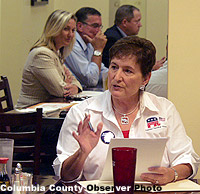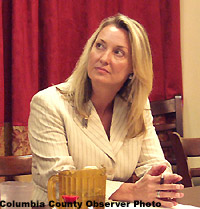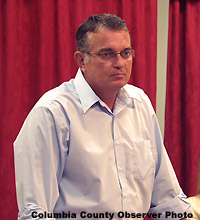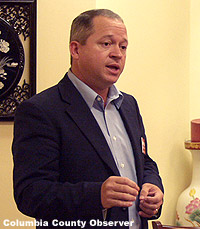Boyd challengers quizzed by Federated Republican Women
Columbia County, FL (posted July 13, 2010 10:30 am)

Sherryl Huseonica of the Federated Republican Women
introduces and reads the rules to the candidates
(reflected in mirror), Elizabeth Porter, Terry Rauch,
and Paul Watson.
The Columbia County Federated Republican Women held a candidate forum last night for the candidates of House District 11, a seat now held by Debbie Boyd. Moderator Sherryl Huseonica asked the candidates a handful of questions, which unsurprisingly had mainly to do with the dire economic conditions in which the state now finds itself.
Each candidate began by introducing themselves.
Paul Watson told the group he was very conservative, a child of God, and believed that "We have to get back to the private sector."
Terry Rauch said he was a native Floridian, a veteran, an experienced negotiator, and said, "I'm in this to bring us back to where we should have been."
Elizabeth Porter said she was a native of Lake City, that she had experience working for Fortune 500 companies and that her experience working with budgets and working with people, as a former County Commissioner, made her qualified for the job.

Former County Commissioner, Elizabeth Porter listens to
one of the other candidates.
Question by Ms. Huseonica: Do you think the Governor should call a special session of the Legislature to ban oil drilling?
Candidates: No – It was a political tool by the Governor to get his name and face in front of the people.
Question by Ms. Huseonica: The state will lose two to three billion in stimulus dollars, which have plugged holes in general revenue, education and health spending. How would you address this shortfall?
Ms. Porter: Government should live on what it brings in. We should not plug holes.
Mr. Watson: We need to get rid of unnecessary and wasteful spending. We need to use money that is available.

Terry Rauch, a negotiator in real life, took tough
stands and did not mince words with his answers.
Mr. Rauch: We need to look at the books and cut spending. We need to close the DEP, which costs two billion a year and put the offices back the way they were before the department was established.
Question by Ms. Huseonica: Last year the state withheld shared revenue from the counties to balance the budget. Do you support this or would you support more agency cuts?
Mr. Watson: I believe that the state needs to stay out of local government. The local government knows what it needs.
Mr. Rauch: The government should be the smallest entity in the state. Counties need money. If the state is going to cut back, we have to force the counties to cut back.
Ms. Porter: Money can be cut from a lot of places that aren't as necessary as health care. I agree – "Let the state cut first."
Question by Ms. Huseonica: What services would you cut?
Mr. Rauch: I mentioned the DEP. The government needs to be answerable to the people. We need to cut offices that are run by too few people.
Ms. Porter: The question should be, not what we cut, but what we should spend.

Paul Watson, a country preacher and former farmer and
cattleman, is a big proponent of local control and
private enterprise.
Mr. Watson: The government's primary responsibility is to secure the people. The government has too many fingers in too many areas. We need to cut the things that are unnecessary. The government does much that could be handled in the private sector.
Question by Ms. Huseonica: State sales tax revenue will take a hit. How do you propose filling the holes in this fund?
Ms. Porter: I am not in favor of plugging holes.
Mr. Watson: You can't rob Peter to pay Paul. It comes down to being smart and using common sense.
Mr. Rauch: We need to look to the past for the answers to the future. We have to shrink the government. We have to cut taxes like JFK and Ronald Regan.
Question by Ms. Huseonica: Funding for education is being shifted more and more from the state to local property tax roles. Do you support this?
Mr. Watson: The majority of the funding needs to be local.
Mr. Rauch: I am for a voucher program.
Ms. Porter: We were founded as a state. The state should be responsible for what it did in the past.
Question by Ms. Huseonica: What is your opinion on Florida taxation?
Mr. Rauch: I am in favor of the Fair Tax. We have to keep the money in the people's pocket. The state has to cut things.
Ms. Porter: I support the Fair Tax. It is probably not going to come for a long time, but we need to work on it.
Mr. Watson: Taxation is not the answer. We cannot tax ourselves into prosperity. I agree with the Fair Tax.
All the candidates agreed that illegal aliens must go.
Question by Ms. Huseonica: How would you support putting people to work in agriculture, which is the number one industry in this area?
Mr. Rauch: We have a lot of farm land around here. We need to find out what the people want.
Ms. Porter: We are an agricultural state. We have to be supportive. We can use crops for alternative fuel.
Mr. Watson: We need to quit raising a generation that is too tired to work. We need to quit giving handouts. I come from generations of farmers and cattlemen. The industry is regulated to death. We need to quit regulating.
Wrap up – closing remarks
Mr. Rauch: This campaign is not about Republicans and Democrats. I am tired of being told what I can and can't do by a government that works for me. I want the Constitution to control this state. I want our country back. I want our capitalism back and hopefully you agree with me.
Ms. Porter: I love this kind of work. We need to stand up to the Federal government and say no. I want us to live in the greatest country fifty years from now, as we did fifty years ago. It is my desire to help everyone.
Mr. Watson: I have a strong desire to be your representative. The government is top heavy and has lost perspective. I want to make a difference for you.
